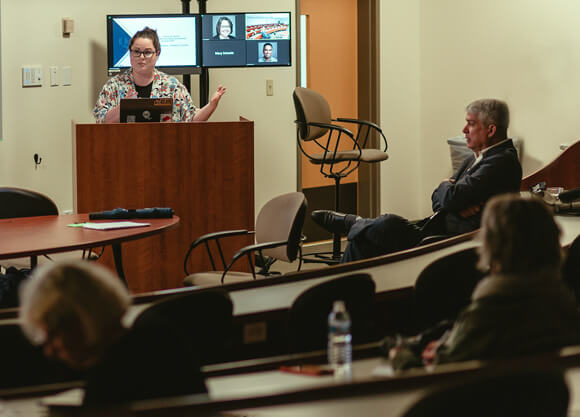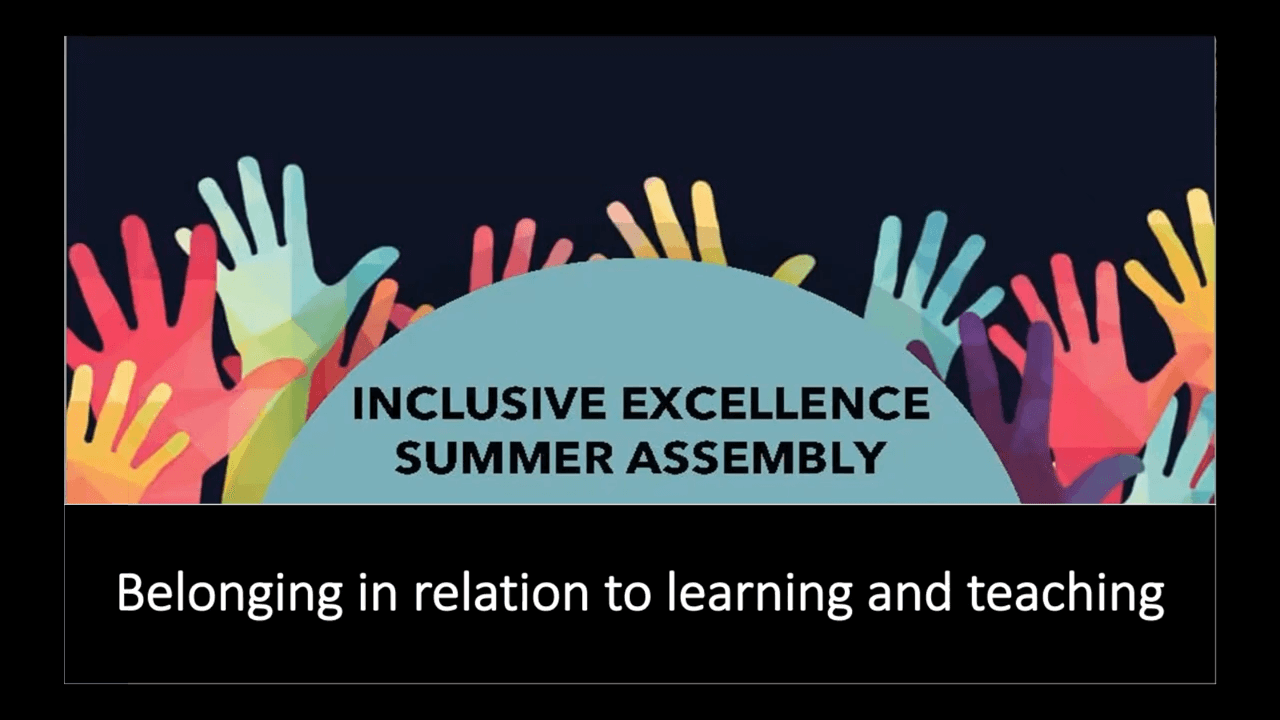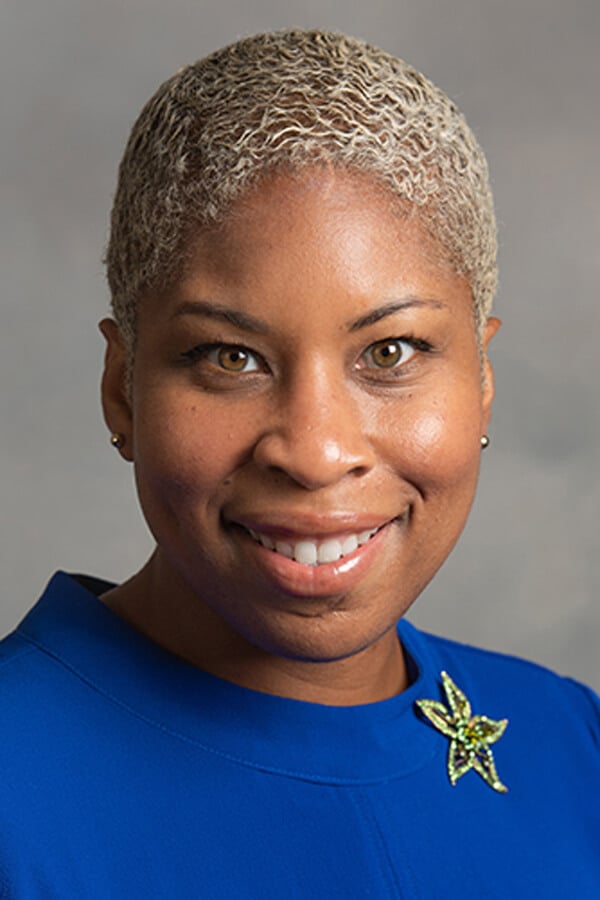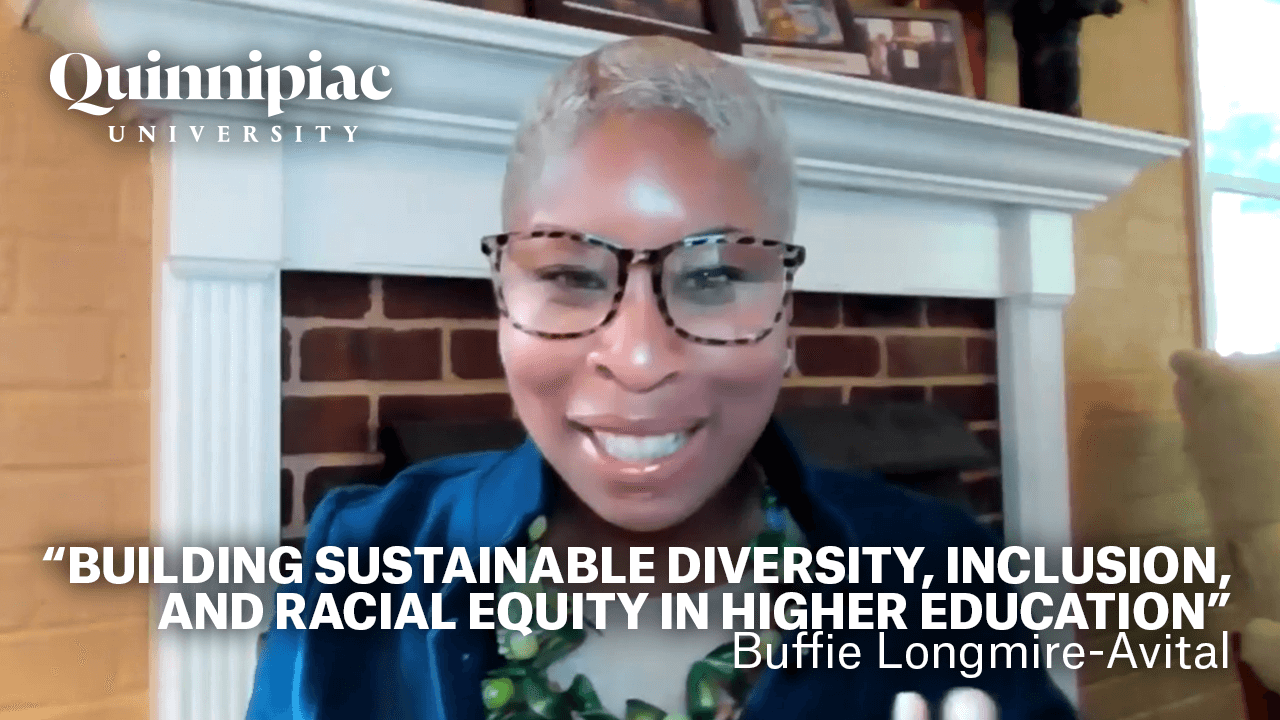The 2022 Inclusive Excellence Summer Assembly embraced "unconferencing"— this modality entails democratic spaces of discussion that emerge from the interests expressed by participants throughout the morning sections. Throughout the event, attendees discussed how the work we do affects the possibility of belonging that everyone needs to learn and teach, as well as how our learning and teaching are affected by this sense of belonging.
Chair: JT Torres
-
Development of Professional Identity Through ePortfolio Pedagogy and Undergraduate Mentorship Models (Oveen Joseph, Marissa McKinley, JT Torres)
-
The presentation will define and highlight findings from our current study in ePortfolio pedagogy that has shown to capture the rhetorical assemblage of a Quinnipiac student completing their undergraduate degree. The artifacts collected through the study have shown evidence of rhetorical assemblage (the synthesis of new identity through previous and current life experiences). The presentation will also highlight the student perspective of undergraduate mentorship models. The student-teacher relationship can be a catalyst for personal and professional growth and the success of both the student and the teacher. As members of an institution, it is important to reflect on the different relationships we form with different community members. Moreover, it is important to recognize how those relationships will play a role in the development of identity and belonging at Quinnipiac. Overall, the presentation offers both faculty and student perspective on ePortfolio pedagogy, rhetorical assemblage and undergraduate mentorship models as important cogs of the larger machine that is institutional change at Quinnipiac and possibly other institutions.
-
-
The Use of Standardized Clients to Practice Social Work Skills with Diverse Populations (Stephanie Jacobson, Emily McCave)
-
Social work students are required to take Practice with Individuals and Families. Though the course always provided multiple methods to prepare students to apply skills, including role-play, the instructors worked to add standardized client interactions that specifically highlight practice with diverse populations. Students watch videos developed by the instructors, which feature Mrs. Sandy Feldman, a Jewish mother struggling with post-partum depression. Two cases were adapted (Bogo et al., 2014) and expanded for use in the classroom across eight sessions. Ms. Peters is an older adult white female who is struggling with social isolation. Mr. Gonzalez is a Mexican-American male coping with the death of his wife. Students also participate in an Objective Structured Clinical Exam for Social Work (OSCE-SW) with a client named Adilia (Bogo et al., 2014), a 20-year old Muslim female college student, who presents to the counseling center with anxiety related to questioning her sexuality and its relationship to her family’s cultural and religious beliefs. Through recorded videos and standardized clients in class, the OSCE-SW students engage with four diverse cases across the semester.
-
-
A Framework for Listening with Consideration of Intersectionality (Katie Place)
-
Intersectionality is the notion that power relations affect the interplay and shaping of social categories—such as age, race, class, gender, sexuality, ability and ethnicity—across individual and societal existence (Collins & Bilge, 2020; Rice et al., 2019). It holds that identities mutually construct and reinforce one another (Collins, 1998, 2000; Crenshaw, 1989, 1991). It also provides an analytic tool to identify forms of oppression and inequality that come from such power relations, challenge conventional thinking of marginalized communities and offer new ways of looking at inequality (Collins & Bilge, 2020; Dill & Zambrana, 2009). Listening with consideration for intersectionality is a practice that can bridge organizations and publics to promote critical reflexivity and address inequality at interpersonal, organizational and societal levels. Listening with consideration for intersectionality may foster respectful dialogue, attending to the ways that power and inequality manifest differently cross publics. In this session, presenters will share insights from their qualitative research with communications professionals across nonprofit, corporate and governmental contexts regarding how they embody listening with consideration for intersectionality via reflexivity, interpersonal sensitivity, organizational programs and community/coalitional collaboration. A framework for listening with consideration for intersectionality, including actionable steps to take, will also be shared.
-
Chair: Jessica Devine
-
High Impact Strategies to Empower First-Generation Students to Succeed in College (Jaime Flores, Courtney Mayberry)
-
This workshop aims to understand the lived experiences and intersectionality of first-generation college students at Quinnipiac University. Presenters will discuss systemic and institutional barriers first-generation students face in higher education and identify asset-based strategies. The panel will also identify strategies for supporting first-generation students and bridging gaps in cultural capital through asset-based programmatic approaches, services and skill-building.
-
Chair: Wasim Ahmad
-
How Ability Media is Raising Awareness of Disability Issues (Chris Roush)
-
Ability Media, a project of the Quinnipiac School of Communications, aims to raise awareness of disability issues in the media. News organizations vastly underreport disability issues, as few have full-time disability reporters, and TV shows and movies underrepresent disability characters despite the fact that 26% of the U.S. population identifies as having a disability. Students involved in the Ability Media project have been producing written stories, videos, podcasts and social media posts about disability topics.
-
-
Cultivating Creativity (Madisyn King, JT Torres)
-
The main objective of the presentation is to educate both faculty and students on how to include more creativity inside and outside of the classroom. The discussion will be catered toward facilitating growth and an open mind to learning and including knowledge from multiple sources.
-
-
Communicating with Everyone: Accessible Social Media Strategies (Mary Dunn)
-
Our campus community utilizes digital communication tools to achieve a variety of goals for organizations, teams, schools, classes and more. Social media accounts are run by students to generate engagement with programming and build awareness for student experiences. Faculty and staff utilize social media accounts to support community events, course offerings, school resources and industry networking. The university utilizes social media for recruitment, alumni relations, public safety and more. And we all use social media to connect with friends, family and colleagues. These digital tools are powerful, but unfortunately, are not built in formats that are accessible for audiences that are disabled. Those with limited sight, impaired hearing and neurodivergence are best served by messages that are posted using accessibility in mind. Based on a unit in a social media courses, our presenters will offer best practices for sharing social media content and digital communication that is inclusive by introducing the audience to accessibility tools. This approach to communication will make sure all audiences of our accounts feel welcome and can experience belonging, including in our digital community.
-
-
Media, Art and Transformative Visions (Mary Schmitt)
-
Many students on our campus are trying to change the world for the better. They are actively building a society that is more equitable and just. They are raising awareness about the many problems in our society and they are re-imaging a world that we all deserve. In their creative visions, students are exploring social justice issues and the need for transformation through a variety of mediums, such as music, film, poetry, painting, dance, theater, open mics, video essays, podcasts and photojournalism. Our presenters propose that this creative and critical work be celebrated and highlighted through an exhibition and roundtable. Students, working with a multitude of mediums and addressing different topics and issues, will first showcase their work and then open a discussion with the audience. The goal is to recognize these socially committed projects and build a community around social justice issues and transformation.
-
Chair: Anna-leila Williams
-
Belonging as an Outcome (Margarita Diaz, Ruth Kaplan, Claude Mayo, Ari Perez, Yvonne Sanders, Laura Willis)
-
Inspired by Arthur Chan’s quote, “diversity is a fact, equity is a choice, inclusion is an action, and belonging is an outcome,” this roundtable discussion will consider the process by which belonging occurs. Led by panelists’ brief presentations on the inclusive actions they have identified as impacting their own sense of belonging at Quinnipiac, as well as actions they employ to garner belonging among others, the session will dedicate significant time to developing the audience’s belonging within the conversation by encouraging all present to share their own perspectives on belonging as an outcome. Our panelists include both faculty and staff, represent three different schools and two different offices on campus, and embody multiple social identities. Our areas of focus will include both professional and personal problems for inclusion. We will consider, for instance, how to foster belonging for neurodivergent students; how to reconnect students who have infringed on academic policies with our academic community; what kinds of belonging employees value in their workplace; the impact of linguistic difference on a sense of belonging; and how authentic collegial collaboration creates a sense of community.
-
Chair: Cindy Kern
-
Decolonize QU (Gabriella Colello, Christina Dickerson, Daniel Galvet, Nita Prasad, Marcos Scauso)
-
Similar to ideas of anti-racism, inclusivity, diversity and equity, the notion of decoloniality often acquires different meanings in relation to particular contexts and experiences. This diversity of decolonial perspectives emphasizes the importance of understanding multiple voices denouncing obstacles against inclusive excellence while also paying attention to the diversity of alternatives that need to be heard in order to enable deeper possibilities of belonging. In this roundtable, participants will discuss experiences of decoloniality related to the United States, Oceania, Latin America, South Asia and Quinnipiac descendants. Based on these experiences, the participants will analyze a number of colonial legacies that affect our possibilities of learning and teaching at QU. The discussion will also include the examination of the implications and alternatives that unfold from each approach and perspective.
-
-
How Do We Conceptualize Representation?: The Struggle of Finding Oneself in within a Eurocentric Framework (Ana Allen)
-
Women of color are expected to attain excellence always; to carry the weight of all people, perceptions and accountabilities on their backs both figuratively and humanistically. In this presentation, we explore how we conceptualize role models and representation in relation to work motivation, visualization of positive figures and figuring out one's place in life. Our presenter will discuss their own experience as a Black woman of color navigating higher education with these struggles as well as how she created representation and how she plans on helping fill the gap in this issue. Her methodology is both comparative and psychological.
-
Chair: Carol Awasu
-
Library Anxiety (Gina Addona, Lisa Adriani, Cecilia Dalzell, Rachel Lerner, Jillian Silverberg, Matthew Wilcox, Robert Young)
-
Library shame and anxiety is a phenomenon of inadequacy and inferiority experienced by many undergraduate and graduate students. These feelings create a series of barriers that can hinder the students’ academic and professional success. This panel presentation of Quinnipiac librarians will explore the definition, history and theory of library shame as well as make suggestions on how faculty can talk about the library and its resources to reduce these barriers. Other panelists will highlight library efforts to combat library shame by creating a sense of place and belonging; demystify the library; and make the library a safe and welcoming space, both physically and virtually. This includes special projects, resource development, collection development and collaborative efforts.
-
Chair: Iddrisu Awudu
-
Supporting Quinnipiac’s International Students (Sarah Driscoll)
-
This session will highlight the important presence of international and immigrant-origin students at Quinnipiac. We will examine the demographics, geographic distribution and enrollment characteristics of our international students to inform our discussion on the student experience. We will share student insights on their lives inside and outside the classroom as well as unique aspects of their experience including navigating visa regulations, travel and cultural adjustment issues.
The session will also explore scholarly research on belonging that focuses on how international students learn about U.S. concepts of race and racism and how such concepts shape their college experiences. We will include a discussion on how to foster an inclusive and welcoming environment for Quinnipiac’s international and immigrant-origin students.
-
-
Adding Inclusive Excellence to First-Year Biology Courses (Michael Vieth)
-
Biology 150/151 lecture and labs are required courses for first-year biology majors, taught to incoming first-year students of varying socio-economic backgrounds, ethnicities and gender identities. The goal for the 2021-2022 academic year was to engage all students in a classroom climate that emphasized inclusiveness, awareness and understanding of all people. Strategies implemented were a purposeful meet and greet, assignments related to global issues, and the scaffolding of scientific skills. Transforming the 150 and 151 biology courses in these ways better aligned the courses with the university-wide initiative for inclusivity and equity within the classroom.
-
-
Behind the Scenes of 2022 PEARLS (Perspectives on Equity Advancement Research and Learning Symposium) (Alice Chen, Tiana Clemons, Maureen Helgren, Sarah Yoder)
-
On March 2, 2022, a subcommittee of the Netter School of Medicine student group, Equity, Inclusion, & Diversity Collective (EID-C), hosted the first annual PEARLS. The EID-C, initiated in 2019, implements strategies alongside faculty members to address bias in the medical school curriculum and experience. During 2020-21, members of the EID-C brainstormed an initiative to incite innovation within the Netter community by highlighting activating and inspiring solutions that advance diversity, equity and inclusion (DEI). Using an asset-based development framework, the PEARLS team designed an event to celebrate the strengths of our community and embolden learning and engagement within the DEI space. Through a thoughtful and collaborative process, three focuses for the symposium emerged: 1) Change Agents – amplifying the successes of our faculty and staff in advancing DEI; 2) Student Grand Round Student Pitches - providing financial support and mentorship for student-driven projects devoted to improving DEI at Netter and beyond; 3) 15% Better Initiative – an initiative that empowered attendees to engage in small steps that in summation make for a more just and equitable society. The panel will share their experiences regarding the process, outcomes and approach to event day and nurturing a team centered in respect, compassion and excellence.
-




